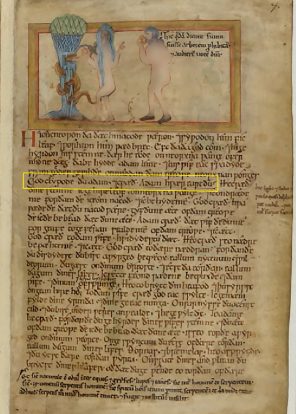As Christian students (CSOC UT Austin), we want to know the incredible history of the Bible.
ÆLFRIC OF EYNSHAM WAS AN ENGLISH BENEDICTINE MONK who lived from A.D. 955 to 1020. Within him, was the wealth of centuries of Christian truths, but around him, Ælfric saw a people crumbling in spiritual poverty. He was distressed that both monks and the common people were ignorant of basic theology and that few had any knowledge of Latin. Hence Ælfric determined to solve illiteracy and the ignorance of Biblical knowledge to which literacy for every man was the key. Ælfric eschewed the obscure and ambiguous sermons and homilies available to believers at the time. He considered their sweeping exhortations to virtue inadequate to help believers and Ælfric understood that exposure to the rich truths of the Bible was necessary to inspire believers to live out their faith.

In A.D. 990, Ælfric began to compose a series of homilies based on the theology of the early church fathers. He followed with three works to help students learn Latin by adapting Latin grammar into English and creating the first vernacular Latin grammar in medieval Europe. His crowning achievement is the translation of the Book of Genesis up to the story of Isaac. This work represents the first translation of the Old Testament into English. Ælfric translated the Latin text according to its meaning and sense rather than a strict, word-for-word rendering that often produces confusion for the reader. He modified his translation to keep the English as close as possible to the Latin text, while simultaneously allowing the reader to understand with little difficulty the intended meaning.
In Ælfric’s time, the dominant and only available Bible was the Latin Vulgate. The requisite demand for translating the Vulgate was to follow the exact word order in Latin because not only was the Vulgate considered sacred, but even the word order itself.
The Latin Vulgate for Genesis 3:9 is “vocavitque Dominus Deus Adam et dixit ei Ubi es.” If Ælfric strictly follows the Latin word order, then his confusing translation would be: “And he called Lord God Adam, and he said to him: where you are?“
Instead Ælfric abandoned this practice and translated Genesis 3:9 according to the sense of its reading to produce a clear translation. In Old English, the actual text of Ælfric’s translation is “God clypode ðā Adam, ⁊ cwæð: Adam, hwǣr eart ðū?“, which in Modern English is “God called to Adam, and said: Adam, where art thou?“

Through his works, Ælfric developed a uniformity of the Old English language and vocabulary. Rejecting the complicated style of Old English, he created an elegant and rhythmical prose that was easy for people to learn and remember. His prose style became a foundation for writers in the late Middle Ages and the Renaissance. As a result, Ælfric’s works would affirm the suitability of the English language as a vehicle for complex theological exposition and manifest the common man’s hunger and capacity for Biblical truths and understanding. This development will set the stage for the translation of the entire Bible into the English language.